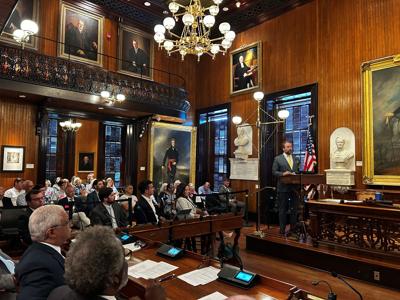In his first State of the City address , Charleston Mayor William Cogswell highlighted one of the most common complaints of city residents: New development is outpacing public investment in infrastructure, particularly roads, and that's degrading our quality of life. He also used a broad brush to describe a new initiative that he hopes will help tackle this: City staff has been laboring for months to create a set of maps showing existing zoning allowances, road congestion, flood-prone areas and sites for new parks and fire stations that, taken together, will help provide the city with a more objective starting point to determine where public investment should go next. "We must be honest with ourselves.
We have not always gotten it right. Too often development has outpaced infrastructure, leaving certain parts of our city struggling to keep up," he said during the final, most substantive minutes of his address. "The challenge is that now we have to make up for lost time and address the explosive growth that is not just on Johns Island but (across) our entire city.

It will not be easy, but it is time for us to catch up.” Mr. Cogswell calls this mapping effort "the most comprehensive initiative, I believe, in our city’s history.
" It's appealing to think his strategy ultimately will lead to more objectivity, less politics and better outcomes for investing public dollars in transportation, housing and drainage work, but it should be noted that much of this public investment comes from — and is therefore partly controlled by — the county, state and federal governments. Mr. Cogswell acknowledged as much, saying it's imperative that the city partner with all these governments, noting, "We also need close collaboration of our neighboring jurisdictions to ensure that our combined growth is both smart and sustainable.
" But the bigger issue is this: Data can only take us so far. It can't tell us how much public money we should invest in new affordable housing. Or whether we should address our congested roads by investing more in public transportation and making our communities safer places to walk and bike.
Or if we should reduce current zoning allowances from low-lying undeveloped properties that will face an increasing risk of flooding over time. Or if we should allow even more density on the highest ground in the city. The answers to these challenging questions will be driven in part by our values, not simply by an empirical set of numbers or expert analyses.
Mr. Cogswell said the initiative will be informed by data but also driven by community engagement and designed to establish trust with residents. He needs to tell us when that community engagement will start and how voters' values — and their often-conflicting feelings toward thorny questions such as density, parking and property rights — will be sorted out.
He said the city is committed to doing the work with integrity and transparency, which was good to hear; he also should provide a timetable for when this initiative will be made public and how the public's feedback will help shape it. The first and perhaps most significant test will be how Mr. Cogswell's effort helps shape the Charleston County sales tax referendum question that many expect will be placed before voters in November 2026.
County Council remains in the early stages of figuring out how to structure this important referendum. Major questions need to be answered including where the money will go, whether there will be a binding list of projects and whether it will be different from previous transportation sales taxes and raise money for affordable housing efforts, as Mr. Cogswell previously suggested.
To the extent that the mayor's holistic planning initiative can build public support for that slice of sales tax proceeds to be spent within the city, it could hold real value for moving the city and county forward. If it doesn't, it ultimately may join other ambitious planning efforts that garner a few headlines before they find a place on a dusty shelf. Click here for more opinion content from The Post and Courier.
.
Technology

Editorial: Cogswell's promising planning effort comes with answers -- and questions

In his first State of the City address, Charleston Mayor William Cogswell highlighted one of the most common complaints of city residents: New development is outpacing public investment in infrastructure, particularly roads, and that's degrading our quality of life.















